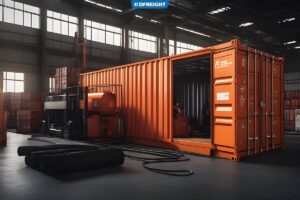In today’s world, increased competition and customer expectations have driven companies to search for new and innovative ways to improve their supply chain operations. One such approach is Lean Logistics, a set of principles and concepts aiming to streamline the flow of goods and services to maximize efficiency and reduce costs. This blog post will provide a brief overview of the concept of Lean Logistics, its principles, and the benefits it can bring.
If you want to streamline your freight forwarding process and simplify logistics, join the digital freight revolution with DFreight! Our powerful platform and services are designed to reduce costs, increase efficiency, and deliver improved visibility and control. Get a free quote today and take the next lean logistics step forward!
Table of Contents
What is Lean Logistics?
Lean Logistics is an approach to supply chain management that focuses on eliminating waste, improving efficiency, streamlining processes, creating constant flow, enhancing collaboration, and achieving quality. Lean management aims to reduce costs while maintaining or improving customer service levels. Companies often employ a combination of process improvement, technology, and organizational change initiatives. The result of these efforts is an efficient and cost-effective supply chain tailored to meet customer needs.
Principles of Lean Logistics
Logistics lean management is based on core principles that aim to improve efficiency and reduce costs. These principles include eliminating waste, improving efficiency, streamlining processes, creating constant flow, enhancing collaboration, and achieving quality.
Eliminating Waste
Logistics lean management is based on eliminating waste from the supply chain. This includes reducing or eliminating unnecessary steps, removing non-essential activities, and streamlining processes to make them as efficient as possible.
Improving Efficiency
This kind of management focuses on improving the efficiency of processes by eliminating waste and streamlining operations. This includes reducing cycle times, improving throughput, and ensuring that the right materials and resources are available at the right time.
Streamlining Processes
It also involves streamlining processes and eliminating non-value-added activities. This includes eliminating redundant steps, improving visibility, and automating processes to reduce manual labor.
Creating Constant Flow
Logistics lean management focuses on creating a continuous flow of goods and services with minimal disruption. This includes managing inventory levels, reducing lead times, and improving the flow of information.
Enhancing Collaboration
It also enhances collaboration between suppliers, manufacturers, and customers. This includes sharing information, establishing common goals, and working together to meet customer expectations.
Achieving Quality
Finally, lean logistics focuses on achieving quality by improving product and service accuracy, consistency, and reliability. This includes establishing and adhering to strict quality standards, implementing quality control measures, and ensuring customer satisfaction.
Benefits of Lean Logistics
Logistics lean management has many benefits for companies that implement it. These benefits include improved efficiency, reduced costs, improved customer service, and increased profitability. By eliminating waste, streamlining processes, and enhancing collaboration, companies can reduce costs and improve customer service. Additionally, lean logistics can help companies become more agile and responsive to customer needs, leading to increased profitability.
Conclusion
Lean logistics is an effective approach to supply chain management that can help companies reduce costs and improve customer service. The principles of logistics lean management involve eliminating waste, improving efficiency, streamlining processes, creating constant flow, enhancing collaboration, and achieving quality. By doing so, companies can enjoy the many benefits of lean logistics, such as improved efficiency, reduced costs, improved customer service, and increased profitability.
Are you looking for a digital freight forwarder that can provide you with an efficient, cost-effective, and reliable supply chain solution? Look no further than DFreight! With our innovative technology and streamlined processes, we can help you reduce costs, improve customer service, and increase profits. Contact us today to learn how DFreight can help your business succeed!
What is lean logistics?
Lean logistics is a logistic system designed to reduce waste and maximize efficiency by removing unnecessary steps and processes. It focuses on improving transportation, inventory management, warehousing, and other supply chain activities.
What are the benefits of logistics lean management?
Logistics lean management can help reduce costs, increase customer satisfaction, and improve operational efficiency and effectiveness. It can also help streamline the supply chain and reduce lead times.
What are the fundamental principles of logistics lean management?
The fundamental principles of logistics lean management are continuous improvement, value-stream mapping, waste elimination, and customer focus.
How can lean logistics be implemented?
Lean logistics can be implemented by analyzing existing processes, identifying areas of waste and inefficiencies, and then making changes to streamline them. It should also involve the use of technology and automation to improve operations.














